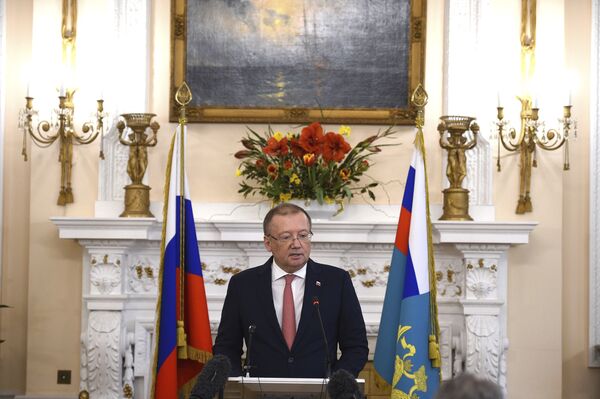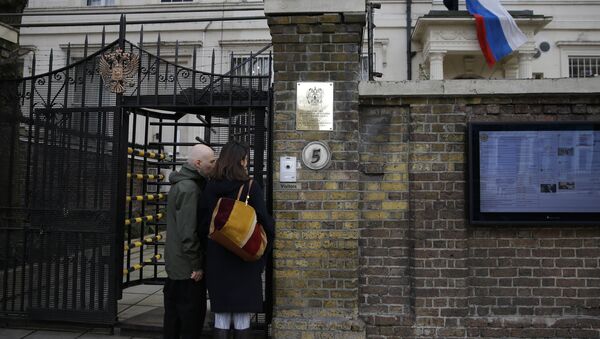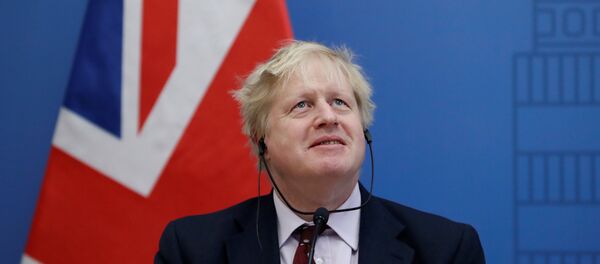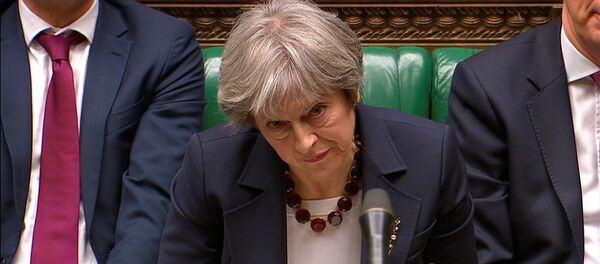"Therefore, the British Government has violated its obligations under the Vienna Convention on Consular Relations by denying consular access for the Embassy to the Russian citizens. We continue to insist that the access and full information on the condition of our compatriots, whom nobody has seen since 4 March, should be provided," Russian Ambassador to the UK Alexander Yakovenko said.
The Russian embassy has immediately requested details and materials of the case, the envoy stated.
"The only response we received from the British authorities was a Note Verbale about the medical condition of Yulia Skripal. It did not go further than the official public statements, according to which she was reportedly critically ill, but in a stable condition. The Foreign Office refused to share information on Sergei Skripal, citing his British citizenship," Yakovenko said.
READ MORE: Trump, Macron Agree Action Needed Against Russia Over Skripal Case
"We have been refused consular access to our Russian citizen Yulia Skripal," Russian Ambassador to the UK Alexander Yakovenko said.
The Russian diplomat added that London had only notified Moscow about the condition of Skripal's daughter verbally.
While 10 days have passed, Moscow has received no response, while London has refused to pass samples of the poisonous substance allegedly used to attack Skripal.
The envoy called for checking how British experts could find out the exact type of nerve gas used to poison Skripal.
"The only thing we want to have is evidence," the ambassador said, when asked whether Russia is going to resolutely condemn the Skripal poisoning.
"This is a horrible act, this is the poisoning of the Russian people," he emphasized, adding that Moscow "wants to know the truth" and doesn't understand why London refuses to cooperate.
READ MORE: Lavrov: UK Consciously Undermines Relations With Russia With Skripal Case
"So far, we have not received any information (from the British.) Is there any desire on the part of the British to interact? For us this is a big question," Yakovenko said.
Alexander Yakovenko said that Britain has provided no proof of Russia's alleged involvement in the nerve agent attack.
He suggested that the samples of the so-called Novichok nerve gas could have already been in the possession of a laboratory located just miles away from Salisbury.
Russian experts are puzzled how UK managed to determine the type of nerve gas in the Skripal case in days, but not weeks or months.
The way the British government has been dealing with the case concerns Moscow, he stated.
READ MORE: Kremlin Points at Contradictions in UK Skripal Poisoning Accusations
The UK has a long record of misdoings, he said, including supporting the coup in Ukraine and the invasion of Iraq.
When asked whether he will resign if proof is presented that Russia is behind the poisoning, the envoy stated that London refuses to provide information on the way Sergei and Yulia Skripal are currently treated.
They are Russian citizens, this is legitimate to know that, but "we have no information," he said, reminding about the list of other questions that Moscow had sent to the UK Foreign Office.
"Before answering to you, we want to know answers to at least half of these questioned," he said, noting that "this is very serious for us."
"If a nerve gas was used, they would have died or received an antidote," Alexander Yakovenko said.
"We were blamed on a very serious matter and it is very important for us to know all the details and find out all the answers, so far we see only articles in newspapers, which are not backed by any facts," Russian Ambassador to the UK Alexander Yakovenko said.
A campaign of pressure has developed against Russian journalists in Britain, this is an infringement of international legislation, Yakovenko added.
"Some of Russian businessmen are frightened, some of them are puzzled" as they have been facing more and more restrictions in the UK, Russian journalists have been threatened amid the "wild media campaign," he stressed.
Moscow has an impression that Britain is trying to "find its place in the world amid Brexit," especially with regard to the goal to "deter Russia".
"Could you imagine in any parliament in any country of the world MPs calling for a cyberattack on a foreign country? This is unbelievable!" he stressed.
'Trust But Verify'
Commenting on Russia's expectations with regard to the upcoming EU summit due to be held later in the day, the ambassador stated that the bloc's members need to be shown proof.
He cited Ronald Reagan, saying that his message to the EU is to "trust but verify."
Yakovenko stated that the bloc hasn't seen the evidence, proving Russia's alleged involvement in the case.

The EU leaders are expected to discuss the relations with Russia at a working dinner in Brussels later on Thursday.
According to the source, the draft statement of the European Council includes strong condemnation of the use of chemical weapons on the territory of Europe for the first time since World War II and calls on EU countries to coordinate their actions in the light of the answers provided by the Russian authorities.
'Nobody Has Right to Compare Russia to Nazi Germany'
Yakovenko stressed that London was free to make a decision about its participation in the World Cup, while "nobody has the right to insult the Russian people, who defeated Nazism and lost more than 25 million people," concerning Boris Johnson's comparison of the 2018 World Cup to the 1936 Olympics in Nazi Germany.
According to Yakovenko, such remarks go beyond common sense and will hardly be shared by UK war veterans.
British fans will be safe in the Russian Federation during the World Cup 2018, ambassador noted.
Russia is going to host 20,000 fans from Britain during the World Cup, he added.
On Saturday, The Times reported, citing a defense source, that the United Kingdom was considering a boycott of the 2018 World Cup if Moscow was found to be behind the attack on Skripal and his daughter Yulia.
UK Refuses to Extradite 43 Russian Criminals, Including Serial Killers
"There are 43 Russian criminals on demand, who were involved in crimes in Russia, with some of them being serial killers, who have a residence permit and whom the UK refused to extradite to Russia," Yakovenko said.
"From the British media, and again not from the British authorities, we have learned about the death of the Russian citizen Mr Nikolai Glushkov. The Embassy has also learned from the press that the police investigating Mr Glushkov's death assume that he could have died from 'compression on the neck', suggesting he was strangled… The Embassy immediately requested by Note Verbale full information on the circumstances of the death of the Russian national and on the investigation, but has not received any meaningful response from the Foreign Office so far," Yakovenko told reporters.
According to the Russian ambassador, it seems that the UK side is "deliberately ignoring our requests and continues to avoid any contacts with the Embassy on this matter."
The United Kingdom is ignoring Russian information requests regarding the death of Nikolai Glushkov, a Russian national and former top manager of the country's Aeroflot airline, who was found dead in the United Kingdom earlier in March, Russian Ambassador to London Alexander Yakovenko said Thursday.
"Russia has nothing to do with this incident; that has been repeatedly stated at the international level," the envoy emphasized.
"We don't have any information," Yakovenko told reporters. "The investigation is classified. We don't know the motivation of the British government, and that's why it says: this case is so complicated, we need, let's say, some wisdom of a person like Poirot to investigate."
Earlier, UK Prime Minister Theresa May said that it was "highly likely" that Russia was responsible for the Salisbury incident.
On March 20, 23 Russian diplomats had to leave the UK, as British Prime Minister Theresa May announced a batch of anti-Russia measures in wake of the poisoning of ex-Russian intelligence officer Sergei Skripal, which was blamed on Moscow.
The Russian Foreign Ministry denied all the allegations and requested the UK to allow a joint investigation into the case.







